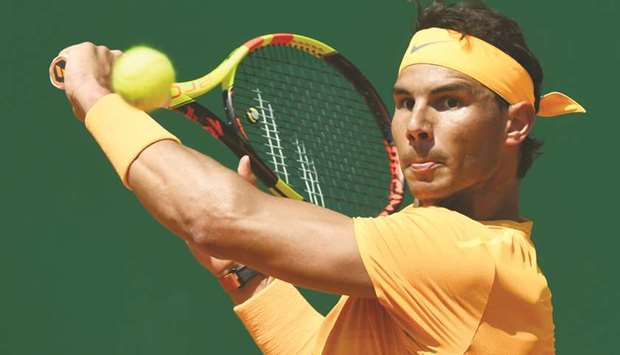When a respected tennis analyst suggested recently that an underarm serve could be an effective weapon in halting Rafael Nadal’s annual rampage on clay most just chuckled.
The trouble is that no one seems to have come up with a better plan to the throw the Spaniard off-kilter as he eyes a record-extending 11th French Open title.
The 31-year-old has rarely been a hotter favourite heading into the Roland Garros fortnight.
Apart from Nadal only Roger Federer, Stan Wawrinka and Novak Djokovic have got their hands on the Coupe des Mousquetaires since 2005 and Federer will miss this year’s tournament while the form of Wawrinka and Djokovic is questionable.
Nadal claimed his 10th French title last year, sweeping through the fortnight without losing a set, taking his career Roland Garros record to an astonishing 79-2.
In Madrid this month he won his 50th consecutive set on clay before Austrian Dominic Thiem finally snapped the year-long sequence, only for Nadal to win the Rome title last weekend.
The truth is when Nadal is fully firing, conventional claycourt combat against the Mallorcan is an exercise in futility.
Yet, with very few exceptions, that is what players attempt to do — engaging in baseline rallies that inevitably have one outcome and often involve a fair degree of pain.
Once Nadal plants himself two metres behind the baseline and spins his web of forehands, there is no escape.
Which is why Craig O’Shannessy, the ATP’s strategy guru, founder of the Brain Game Tennis and tactical adviser to Djokovic, threw out the idea of an underarm serve.
“Some people lost their mind at the suggestion of it,” O’Shannessy, who devised Dustin Brown’s attacking blitzkrieg that took out Nadal in 2015 at Wimbledon, told Reuters.
“The idea was perhaps just throw in one! It goes under the heading of you need to do things that make him uncomfortable, make him think twice, get inside his head.”
There is a solid logic to O’Shannessy’s argument — in that Nadal stands a huge distance behind the baseline when receiving on clay, allowing him time to impart massive amounts of topspin and loop on his returns.
“Rafa backs up so far when he’s receiving serve he’s halfway to Moscow. So an underarm serve? Why not?” O’Shannessy said.
“People think it’s illegal. But it’s a legit shot. I’m not advocating a player continually doing it because a player like Rafa would adjust. An underarm serve might not win the point, but it throws a curve ball into the match.
“You need an agent of disruption. Perhaps a slow serve and volley, more drop shots. Do something radical.”
When Thiem beat Nadal in Madrid he used the higher altitude and thinner air to step in and take the ball much earlier than he usually does — rushing Nadal and dictating rallies.
It is a tactic Alexander Zverev also used in Rome where he pushed Nadal to three sets in the final.

Rafael Nadal
